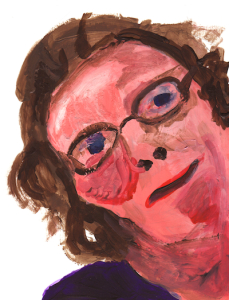You and me, we have our little troubles.
Pale yellow. Emergencies. Needlepoint roses. Crystal figurines. Nice furniture you save up for. Stained dark wood cabinets. Slow movements.
Wrapping paper. Wallpaper. Yarn. Looking away. Seeing things that our loved ones deny. Being lied to. Asking for help. Being laughed at. Holding your head in your hands. Using the telephone. Calling again. Looking inside.
You say: Don’t come to me in the night. Don’t wake me up. Don’t follow me in here. I can’t write you letters anymore. I don’t bake anymore. I don’t want to move fast. My brain moves quickly but my movements are slow movements.
Time has collapsed.
I don’t need you. I don’t need anybody.
Where are my nice plates?
I’m just looking after lost time.
Lucidity. Sorrow. Painted flowers. Socks with grips on the bottom. Reading glasses. Small photographs in frames. Precious things.
Grammie wakes up in the middle of the night. She is alone and she calls for help. Help comes but she doesn’t recognize it and she sends it away.
But Grammie still needs help so she calls out again. When help comes back, it is the same strangers. When the strangers approach and try to explain, she bites them to keep them away. This repeats over and over and no one can sleep.

Illustration by Sarah Mangle
We both see things they say don’t exist.
Me: Hi Grammie. Are you there? How are you?
Grammie: I am here.
Me: What are you up to?
Grammie: I am talking to you on the phone.
Me: What can you see from your window?
Grammie: There are a lot of trees. Where am I? Give me the simple chowder.
Can I keep things safer? Can I rip down the drapes? Can we have some fun? You look like me.
The structures of the possible. The walls. The rules. Our cultured rules. Struggle. The machines of our brains. The machines of everything.
Grammie wants more privacy, and I want more privacy for her. I like to imagine all her things stacked up to the ceiling. I want her big bed crammed in her small room and I want her to be able to go home—where she wants to go. I want her to be able to live with her dead brother and her dead husband in a house in Cape Breton.
I see her private jokes. Her private clairvoyances. Where do our brains rest? What rests in our brains?
I try to plan, to be authentic, but it is tiring.
She’s wearing a nice white and brown striped t-shirt. She looks quite handsome and she says, leaning forward on her walker, looking down the hall, “I feel like a garbage bag.”
Restraint. Restrain yourself.
Grammie remembers the tragedies. Car crashes, heart attacks, and how her brother died. People wonder if he killed himself, but no one really says anything. It’s happening again. She calls 911. The police visit and she talks about a big party. She shuffles along. A big party where everyone will be. There, in the spaces in between.
I meet similar nightmares: police, bad doctors, men, bad teachers.
Terror comes, or we read it as terror. Grammie wakes up in the night and a man she doesn’t know comes in. She will bite him to keep him away.
She’s suspicious of pills. She keeps falling down.
People say: danger is out in the street, it is in the night, hiding. They are right. But it is also in here, dressed up as help.
Me and Grammie know danger exists.
My Grammie wins all the card games she plays.
I’m thirty-one, she’s eighty-five. We have identical noses. We have similar eyes and our hair puffs up. As she ages, she looks more masculine, which makes us look more similar.
Grammie, there are all these things you have given up. Still, you fight for yourself, you hold on. How do we understand these things inside us? Where do they come from?
Grammie: “Your brain moves around and you have to move with your brain.”
Grammie’s dead brother and her dead best friend, Ruth, and her dead husband are all hanging out. And I am there, and we’re watching sports and drinking beer out of her cooler and my mom is baking weed cookies and bringing them over and my Grammie recognizes us. We sit together on her bed and Grammie offers us chocolates and we look at old photographs.
She is just sitting there, and she says, “It’s electricity”
You don’t say goodbye to your memories. They don’t leave you all at once.
Bad skin. Bad blood. Direct opposition. These things are for you.
I try to take my Grammie in my arms, sliding diagonally across the couch onto my shoulder. I want her to finally cry and shake. I try to tell her she is safe and I will protect her from death, but she is straddling death and she misses those people.
 Sarah Mangle is a writer and artist and copy editor living in Montreal with her partner, Emma, and dog, Logan. Sarah’s work has appeared in FUSE, Make/Shift, No More Potlucks, Broken Pencil, Herizons, Lickety Split, and Pilot Pocket Book 2 and various zines, among other places. Sarah’s current projects include The Affirmations Colouring Book, and a graphic novel further exploring the last years of her Grammie’s life. Sarah recently won two 2014 Canadian Labour Media Awards for her Postcards for Postal Workers.
Sarah Mangle is a writer and artist and copy editor living in Montreal with her partner, Emma, and dog, Logan. Sarah’s work has appeared in FUSE, Make/Shift, No More Potlucks, Broken Pencil, Herizons, Lickety Split, and Pilot Pocket Book 2 and various zines, among other places. Sarah’s current projects include The Affirmations Colouring Book, and a graphic novel further exploring the last years of her Grammie’s life. Sarah recently won two 2014 Canadian Labour Media Awards for her Postcards for Postal Workers.